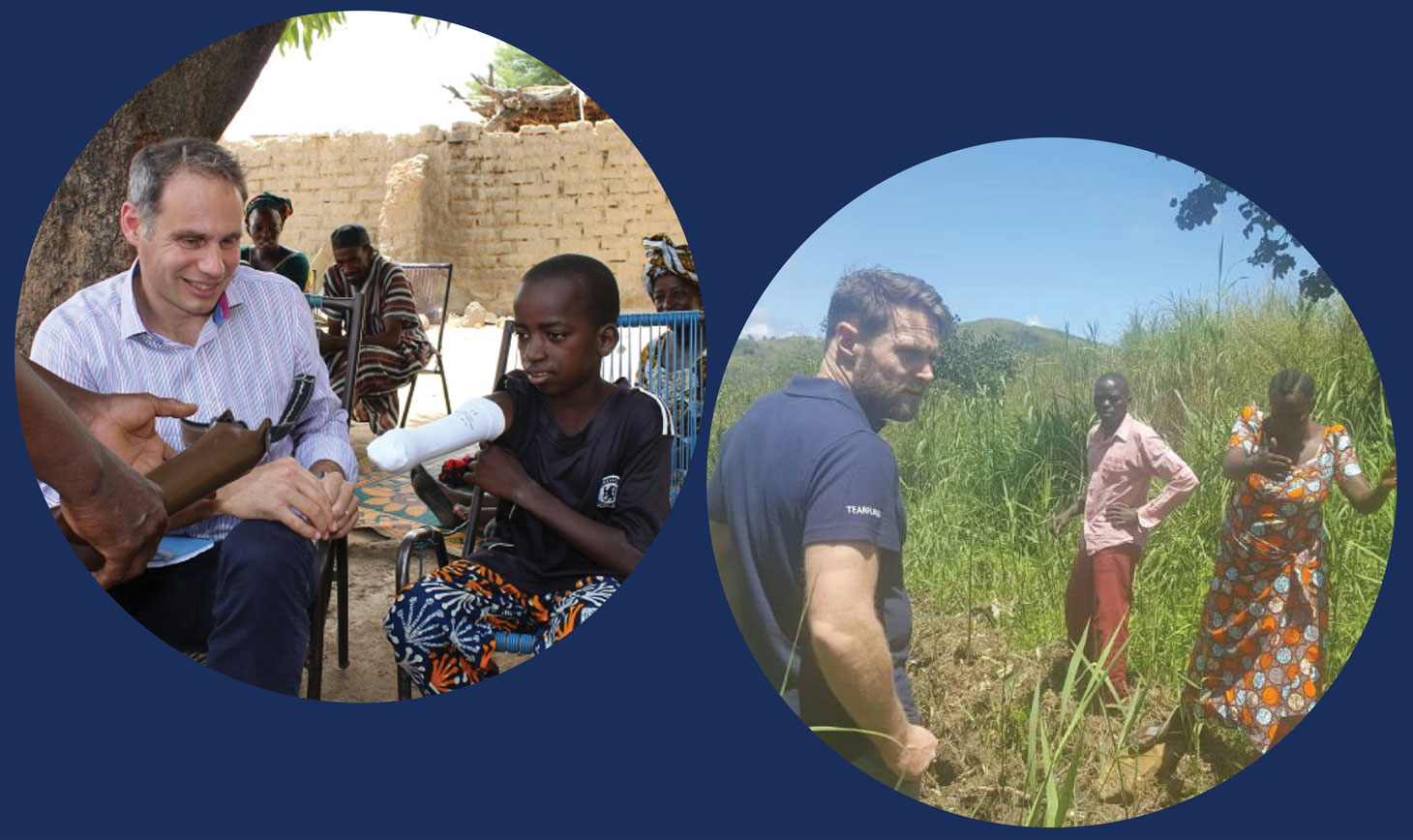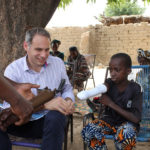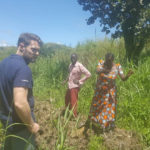
On the front line: international charities
It will come as no surprise that the charity sector has experienced huge challenges as a result of the recent pandemic. Not only is lack of fundraising income causing many smaller charities to close, but the work that charities do to support the most disadvantaged in the world has been affected in ways that we couldn’t imagine. We spoke to two former students about how their charities are working to meet the increasing need for help…
Protecting vulnerable young women and girls
 David Thomson (RGS 1979-88) is Executive Director of Strategy, Insights and New Ventures for Plan International. David has worked in the field of humanitarian, development and human rights for over 25 years and has led operations, and lived in, diverse and challenging situations in Afghanistan, Armenia, Chechnya, Kenya, Liberia, Russia, South Sudan and Uganda.
David Thomson (RGS 1979-88) is Executive Director of Strategy, Insights and New Ventures for Plan International. David has worked in the field of humanitarian, development and human rights for over 25 years and has led operations, and lived in, diverse and challenging situations in Afghanistan, Armenia, Chechnya, Kenya, Liberia, Russia, South Sudan and Uganda.
“Although not directly on the front line now, through my work with Plan, I support the advancement of children’s rights and equality for girls in over 75 countries around the world. Working with our partners, young people and supporters and with those in power, Plan International is scaling up global efforts to achieve equality for girls.
COVID-19 is an unprecedented crisis. The world we live in right now is totally different than it was even a few months ago, and it is impacting girls and women especially hard. The pandemic is profoundly affecting the environment in which children grow and develop. The challenges for children, particularly girls, ranging from disruption in education, increased risk of sexual violence and mental health issues, is much greater in poorer countries. We are working hard to ensure girls, young women, children and vulnerable groups are protected and supported as the COVID-19 crisis continues to unfold.
Prevailing gender norms are worsening the knock-on effects of the pandemic, resulting in the longer-term widening of existing gender gaps. We are already seeing substantial increases in domestic violence, increased care burden on girls and women, risks for girls to not return to school when confinement ends (currently 743 million girls out of school in 185 countries) and increases in child marriage and teen pregnancies.
A learning from the Ebola crisis revealed a temporary suspension of female genital cutting/mutilation; this may be the case in the current COVID-19 crisis as well, but may also be temporary, with a further increase post-pandemic as a result of strengthened traditional norms and reduced activities to prevent it. These gendered trends are happening against the backdrop of increasing social, economic and cultural inequalities and injustices, and girls and women are likely to bear the brunt of this widening inequality.
Access to digital opportunities and services have become even more important. In many countries, and particularly in those with stronger digital and service infrastructure, more services are offered and used online, ranging from education to health, and from fundraising to remote working. But as things move online, girls and women are increasingly at risk of harassment and abuse. Half of the world remains offline, and the majority of those offline are female. Girls and women also have on average less opportunity to use phones and the internet, and are confronted with higher suspicion when using them. Limitations to mobility (e.g. to access free WIFI) and closures of schools, community centres and internet cafés further reduces girls’ previous access to the internet. This limits opportunities for girls and puts them further behind.
We are witnessing a silent and lethal shadow pandemic unfolding across the globe as millions of girls are witnessing the erosion of their sexual and reproductive health and rights under lockdown. Millions are at risk as sexual abuse, unintended pregnancies, and child marriage.
We have recently recognised Menstrual Hygiene Day, and it is more important than ever for girls to speak out about their needs without shame. In Kibera, the largest informal settlement in Kenya (and Africa as a whole), girls have been discussing another emergency – the lack of sanitary pads. Most of the girls rely on free sanitary pads distributed at their school but with the schools all shut to curb the spread of COVID-19, they no longer have access to them. To support girls in crisis, Plan International visited adolescent girls and young women in Kibera to distribute 2,700 sanitary towels. Read more about the Girls get Equal campaign.”
Supporting the world’s poorest communities
 Myles Harrison (RGS 1983-91) is International Director at Tearfund an organisation that works mostly through local partners and churches, supporting them to make long-term change, helping the most vulnerable out of poverty in fifty countries around the world, as well as responding in humanitarian emergencies.
Myles Harrison (RGS 1983-91) is International Director at Tearfund an organisation that works mostly through local partners and churches, supporting them to make long-term change, helping the most vulnerable out of poverty in fifty countries around the world, as well as responding in humanitarian emergencies.
“I really enjoyed school, did well on the sporting front as well as the academic side and was Head Boy of RGS in ‘90/‘91. After school I worked and travelled for a year – to Australia, New Zealand and then 14 countries across Africa – which gave me a broader view of the world and meant I gained much more from my time at the University of Leeds.
I then volunteered for World Vision based in the UK, but soon found myself working with internally displaced people in Azerbaijan, followed by a couple of years in Sierra Leone during the conflict. After a few years in the desert sands of Mauritania, I served in Cambodia, back in Sierra Leone, Kenya and Australia (covering Papua New Guinea, Timor Leste, Solomon Island and Vanuatu). It was an amazing 21 years and I feel incredibly privileged to have worked with, and learned from, some amazing people in incredibly difficult situations around the world. Four years ago with my family we decided to return to the UK, and I took up the role of leading Tearfund’s International programmes.
As you can imagine over the last few months that has meant that we have been extremely busy! We were able to quickly establish projects in 33 countries thanks to our generous and committed supporters and a model that really leverages on what churches and partners are able to do locally. These projects are working hard to help reduce the spread of COVID-19 among vulnerable communities as well to support them during this time.
In these times of lockdown (which have taken place across the world – some loosely enforced, others enforced by armies and beatings for non-compliance), people who rely on wages from labour that day to feed their families really suffer. There are no furlough schemes, and no social welfare systems for the people we work with. Not going to work means no income, which means no food, which means worse malnourishment – making them more vulnerable to sickness or worse.
We heard many communities saying they were worried they would starve long before COVID-19 came along. With Venezuelan refugees in Colombia, the Rohingya people in Bangladesh, or communities in Yemen, our partners have been able to help with food, or in some cases cash (where people can shop), as well as hygiene items and even water supply (not much point in telling people to wash hands to prevent the spread if they have no water or soap).
You may hear that the number of cases is so much lower in many of these countries, and we really hope the levels will be less than Europe, but we have to recognise there is much less testing. A week or so ago my colleague in Nigeria told me that they had just completed 100,000 tests for the whole country. That’s not per day as in the UK target, but overall. And Nigeria has 200 million people. With such low levels of testing, clearly the numbers are going to be much lower than the reality on the ground. We also have to remember that most health systems are generally much weaker than the NHS. For example, in Mali, a country of 19 million people, there are just three ventilators, so anyone who develops serious symptoms is really going to struggle.
You may have heard that the charity sector is struggling – with organisations having to lay off staff, close in some countries, and even a number of smaller organisations closing. As you can imagine, when the economy in the UK is so severely hit, many individuals who would usually support charity simply do not have the funds to do so. The degree of impact on a charity varies with those dependent on income from shops or a few major donors particularly impacted. We, like others, have been grateful for the support of the Government’s furlough scheme for those staff who cannot work right now (such as those running events), and have been very thankful to our incredibly loyal supporters who continue to give sacrificially. But we have also had to plan for challenging times ahead, at the same time as increasing our response efforts. It is not an easy time, but we believe we are really having an impact in both reducing the spread of COVID-19, as well as the impacts that it is having on the most vulnerable around the world, and that people will continue to support us in that.
Like everyone else, we are looking to the future and what the ‘new norm’ will look like, and how we capture and continue the good things that have come from us all being on lockdown (such as seeing our partners and local churches really taking a lead in responding effectively, and a more international connectivity as everyone is in front of a screen instead of some people being face-to-face). We also strongly believe that this is a time for everyone to think how to ‘build back better’ and not simply return to a situation that was destroying our planet (see Tearfund’s Reboot campaign). If we all take action on this we do believe that we can make the best out of what has been a terrible time for many and lay out a better future.”
